HomeSurgery for menTop surgery
Top Surgery involves:
- breast removal (Subcutaneous Mastectomy)
- male chest contouring
- nipple/areola resizing and repositioning
Please read our requirements to apply for Top Surgery, in the Procedure section.
Top Surgery is the most commonly performed gender affirming surgery for trans masculine people. After Top Surgery one can live more comfortably, improving psychological and social functioning. It may be the only surgical step that one takes in transitioning.
The different types of Top Surgery include:
The Keyhole Top Surgery procedure is ideal for those who are small chested with an elastic skin. During this procedure, a small incision is made along the bottom of the areola, and the breast tissue is removed through this incision. It can be combined with liposuction to flatten out the area around the nipple areola complex. With keyhole surgery, the nipple stalk is left intact and the areola is not resized. Nerve sensation is maintained.
General anesthesia is used. You are not catheterized.
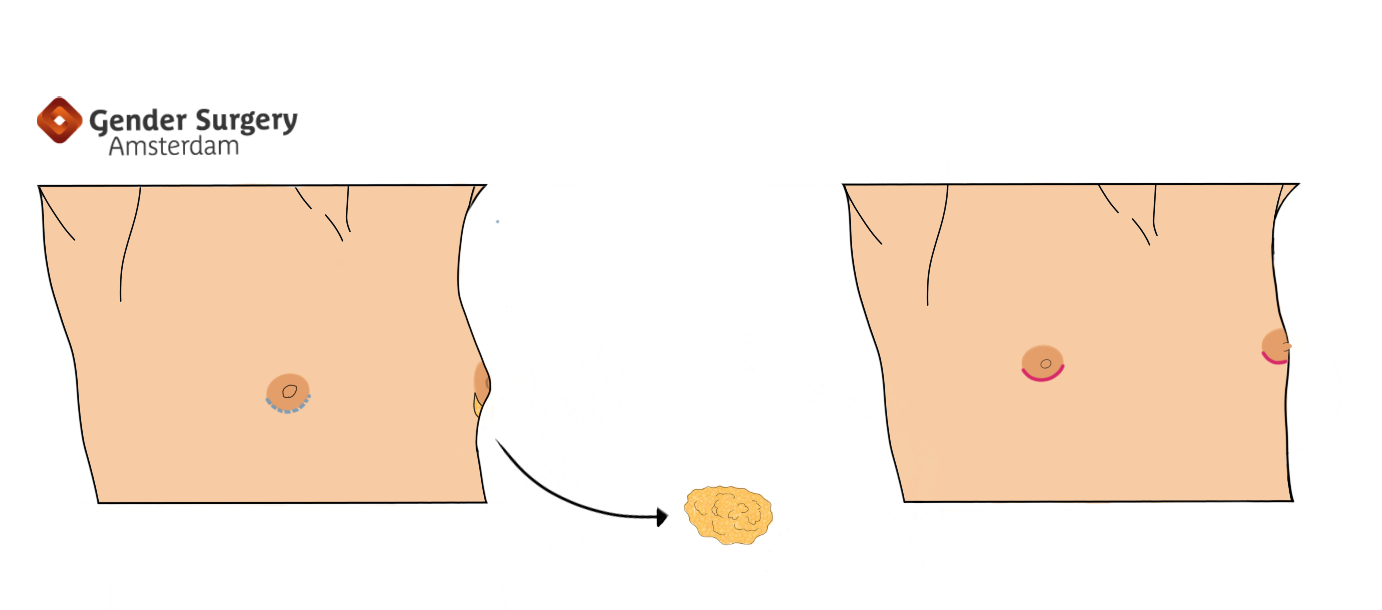
Also called peri-areolar concentric circle technique.
The Donut procedure is ideal for those who are small chested, or those with B-sized chests and good skin elasticity. During this procedure, an incision is made all around the border of the areola. Additionally, a second, larger concentric circle incision is made and the resulting ring of skin removed. After removing the breast tissue, a "pursestring" technique is used to bring the skin together and connect it to the edges of the areola, which may be downsized. With the Donut procedure, the nipple stalk is left intact. Most of times the nipple is not resized due to vascularization issues. Nerve sensation is often partially maintained. Because the inner circle has a smaller diameter than the outer circle some skin wrinkling occurs along the circular scar. Additional liposuction may be performed.
General anesthesia is used. You are not catheterized.
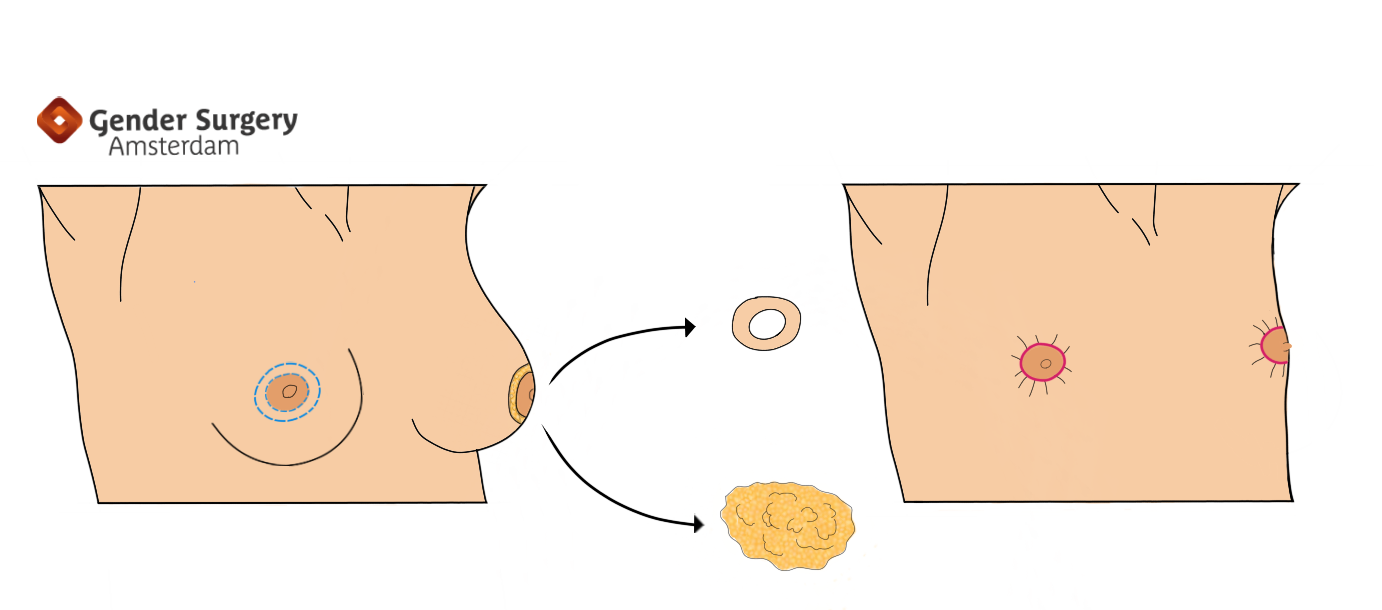
Also called Fishmouth incision
The Batwing procedure is ideal for those with B-sized chests with less skin elasticity and a little ptosis. During this procedure, an incision is made all around the border of the areola and a second, larger concentric circle incision is made. Extra skin on the medial and lateral side of this circle is resected in a triangular way. The resulting ring with lateral triangular extensions of skin (the “Batwing”) is removed. The horizontal scar will be in line with the areola. The areola may be downsized. With the Batwing procedure, the nipple stalk is left intact. Most of times the nipple is not resized due to vascularization issues. Nerve sensation is often partially maintained. Additional liposuction may be performed.
General anesthesia is used. You are not catheterized.
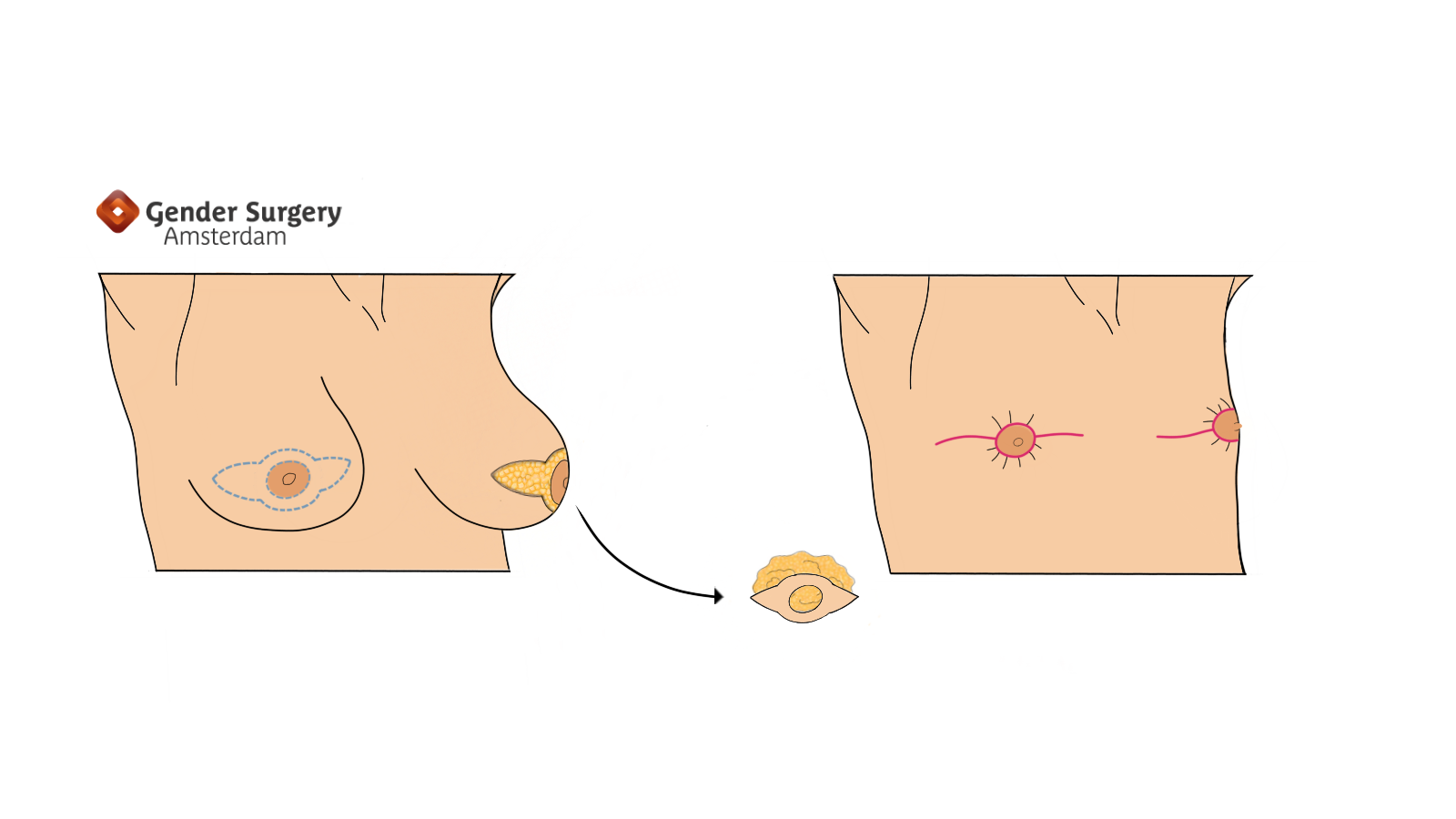 Double Incision Top Surgery
Double Incision Top SurgeryThe Double Incision Top Surgery procedure is the most often-used technique and is ideal for those who are medium to large chested. During this procedure, the skin on the chest is opened along two horizontal incisions, just cranial of the niple areola complex and in the inframammary fold. The skin is pulled back and the breast tissue is removed. Additional liposuction may be performed to adjust contour. The resulting scar is placed in the inframammary fold.
Nipples are removed, re-sized, defatted and grafted on the chest at the desired place. The nipple grafts are bandaged in a dressing that is sutured to the skin to promote ingrowth. These dressings will be removed on the outpatient clinic at the 5th postoperative day. After nipple grafting you have limited sensation through the nipple/areola complex.
Sometimes is it possible to maintain the original nipple/areola complex stalk and nerve. In those cases the NAC retains its blood supply and usually (partial) nerve sensation is preserved.
General anesthesia is used. You are not catheterized.
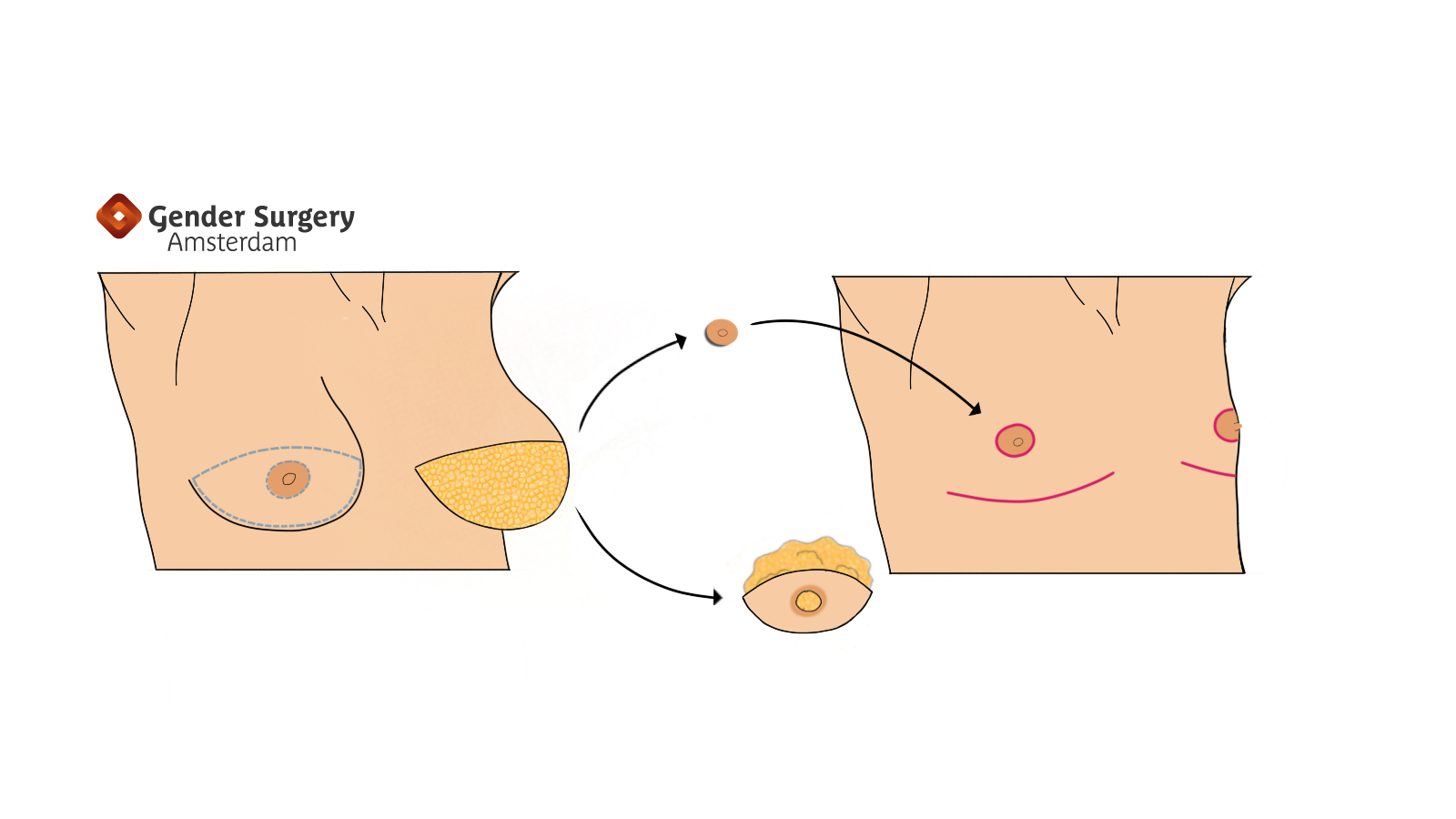
The Inverted-T Top Surgery procedure is ideal for those who are large chested with large inelastic skin. The procedure is similar to the Double Incision Top Surgery procedure but with an extra vertical excision. This extra vertical skin excision enables for redraping the chest skin without too much skin folding. Additional liposuction may be performed to adjust contour.
General anesthesia is used. You are not catheterized.
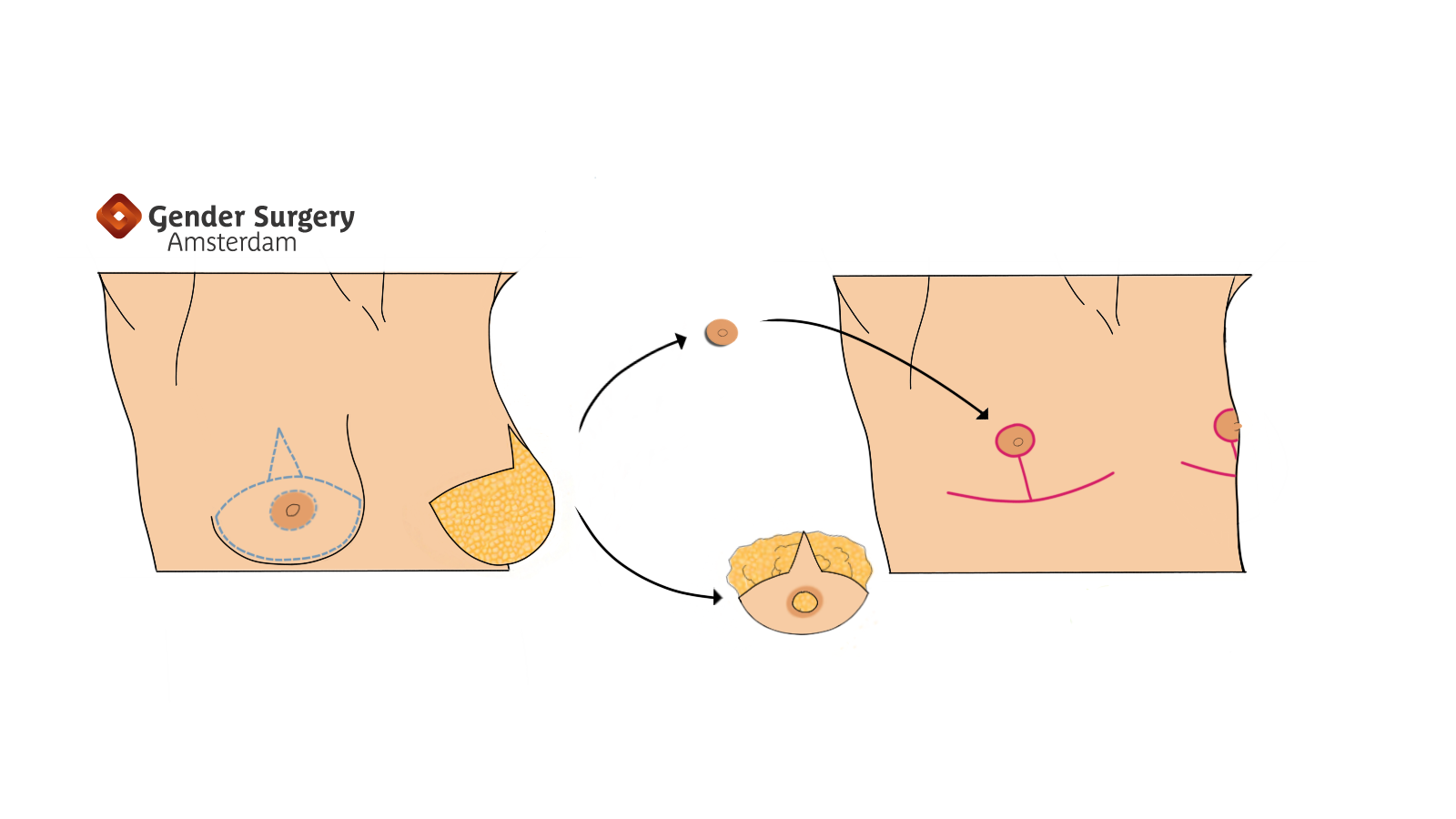
After surgery, most people are left with two medical drains (one on each side) under the skin, that exit through a small incision under each arm, with a reservoir attached at the ends to collect excess blood and lymphatic fluid. These drains are removed one day post operatively.
Most of the time, people return to their hotel the day after surgery. We schedule a face-to-face follow-up after five days. If everything is OK and the wounds are healing fine, you are allowed to go home after that final check.
In a procedure with Free Nipple Grafts (in double incision and inverted T top Surgery) the nipple grafts are bandaged in a dressing that is sutured to the skin to promote ingrowth. These dressings have to stay dry (no showering) and will be removed on the outpatient clinic at the 5th day after surgery.
We advice you to wear a compression binder after Top Surgery, 24/7 for at least 4 weeks. The binder helps prevent fluid build up and aids the skin in adhering back to the chest wall. The compression binder is supplied by our clinic.
Top Surgery at Gender Surgery Amsterdam costs E 7.500
Gender Surgery Amsterdam does not have contracts with healthcare insurance companies. To find out if your healthcare insurance company reimburses the costs of Top Surgery, please contact them.
Some countries work with a Treatment Abroad scheme. It is worth trying to find out if your country has one.
Yes! In Gender Surgery Amsterdam we only work with specialized gender surgeons with a vast experience in a transgender-friendly facility.
Having an experience surgeon is an obvious benefit. An experienced surgeon will produce more consistent results and knows what to do if complications arise.
The Surgeon that you consult with will give you his or her professional opinion as to the most suitable procedure.
The choice of Top Surgery procedure is largely based on chest size and skin elasticity:
Note that skin with poor elasticity, often due to years of binding, can limit the surgeon’s choice of procedure and adversely affect post-operative results.
"Dog ears" is a term that refers to excess skin and fat that "pucker" out at the primary incision line at the medial and lateral side of the scar. Often after Double Incision Top Surgery or the Inverted T procedure. "Dog ears" are probably the most common reason for revision surgery. It's a good idea to find out if dog ear repair is covered in your surgeon's revision policy. Sometimes it is possible to avoid dog ears with Double Incision by doing additional liposuction at the sides of the chest, below the arm pits. You can also help avoid dog ears by staying close to your ideal weight before Top Surgery.
Revision surgery like removal of "dog ears", reduction and/or repositioning of areola, nipple reduction, additional liposuction is being performed in about 20% of the cases. Most secondary procedures are performed after the Donut procedure.
Revision surgery is not included in de costs for Top Surgery.
When you are planning to be operated we advise you to stop smoking. Smoking around the time of the operation increases the risk of wound infections, delay in wound healing and increases the risk of a nipple graft failure or nipple necrosis. All of which can lead to a sub optimal aesthetic result. Our advice is to stop smoking two weeks prior to and two weeks after Top Surgery.
No there is no evidence to support stopping Testosterone prior to Top Surgery. So you don’t have to stop taking testosterone. This is the case for the testosterone injections (Sustanon®, Nebido®) as well as for the testosterone gel (Androgel®, Testim®, Tostran®).
Generally speaking the Top Surgery procedures take around two hours. Depending on the type of surgery.
For work, this depends on the type of job that you have. If you have a desk job, two weeks to go back is recommended. If you have a more active job, that perhaps includes lifting and other more active work duties, it's recommended that you take 4-6 weeks off after surgery.
The day before surgery you will meet with the surgeon and the anesthesiologist. The final surgical technique will be discussed and all your further questions can be answered.
You will be admitted on the day of surgery and have one stay overnight.
After surgery, most people are left with two medical drains (one on each side) under the skin, that exit through a small incision under each arm, with a reservoir attached at the ends to collect excess blood and lymphatic fluid. In most cases these drains are removed the day after surgery.
This is highly dependent on the individual but generally the pain is less than moderate. The anesthetist will take care of your postoperative painkiller regime. Most of time an NSAID like Naproxen in combination with paracetamol will be sufficient.
After nipple crafting, the stitches have to be take out of the bandage, after five days.
For all other techniques, the surgeons at Gender Surgery Amsterdam only use absorbable subcuticular and intracutaneous sutures or skin glue. This does not require removal.
You will receive post-operative instructions from your surgeon about how to care of your scars.
Light activity such as walking is recommended when you are back home. It promotes good healing.
For more strenuous workouts, with weight training especially, you should wait 6-8 weeks minimum. Bodybuilders who have had the double incision Top Surgery should take note that heavy chest workouts should be avoided for even longer, up to 3 months, to avoid stretching the incision scars.
You will feel that for yourself. If it is comfortable to sleep on your side you may do so.
You are advised not to go swimming, take a bath or visit a sauna for the first four weeks after surgery. You are allowed to take a short shower. In case of a nipple graft you have to leave the skin completely dry for five days, so no showering is allowed.
We advise you to wear a compression binder after Top Surgery, 24/7 for at least 4 weeks. The binder helps prevent fluid build up and aids the skin in adhering back to the chest wall.
Light activity such as walking is recommended when you are back home.